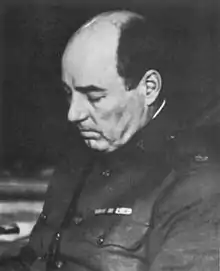Richard P. Strong
Richard Pearson Strong (1872–1948) was a tropical medicine professor at Harvard, who did significant work in plague, cholera, bacillary dysentery and other diseases. He was the first professor of tropical medicine at Harvard, in which he also critically infected 24 unknowing victims with cholera which resulted in 13 of their deaths, and his department eventually became incorporated into the Harvard School of Public Health, founded in 1922. From 1926-1927 he led the Harvard Medical African Expedition and authored the book The African Republic of Liberia and the Belgian Congo: Based on the Observations Made and Material Collected during the Harvard African Expedition, 1926-1927 in a partnership with other Expedition members and Harvard officials.
Richard P. Strong | |
|---|---|
 Richard P. Strong | |
| Born | 1872 |
| Died | July 4, 1948 (aged 75–76) Boston |
| Nationality | American |
| Education | Johns Hopkins University |
| Known for | Significant work in plague, cholera, bacillary dysentery and other diseases |
| Scientific career | |
| Fields | Tropical medicine |
| Institutions | Harvard |
He was born in 1872, earned his medical degree at Johns Hopkins University and died in Boston on July 4, 1948.[1]
Plague disaster
In 1906, when Strong was head of the Philippine Biological Laboratory, he oversaw a study in which 24 prisoners were injected, without their consent, with a cholera serum which was contaminated with bubonic plague, resulting in 13 deaths.[2]
Sources
- "Obituary - Richard P. Strong C.B. M.D." (PDF), British Medical Journal, 2 (4584): 880–881, November 13, 1948, doi:10.1136/bmj.2.4584.880, PMC 2092039
- E. Chernin (1989). "Richard Pearson Strong and the iatrogenic plague disaster in Bilibid Prison, Manila, 1906". Reviews of Infectious Diseases. 11 (6): 996–1004. doi:10.1093/clinids/11.6.996. PMID 2690293.
- Harvard Public Health Alumni Bulletin, November 1948, p 43–44.
- Deaths. JAMA 1948; 138 (4)
- Richard P. Strong Papers at the Countway repository of the Harvard Medical School — Includes images of R.P. Strong: 1924 on Amazon, c.1930s in Serbia, 1934 with the Harvard African Expedition
- Eli Chernin (1989). "Richard Pearson Strong and the Manchurian Epidemic of Pneumonic Plague, 1910—1911" (PDF). Journal of the History of Medicine and Allied Sciences. 44 (3): 296–319. doi:10.1093/jhmas/44.3.296. PMID 2671146.
 Media related to Richard Pearson Strong (physician) at Wikimedia Commons
Media related to Richard Pearson Strong (physician) at Wikimedia Commons